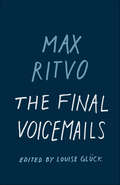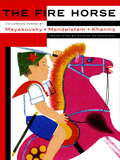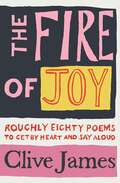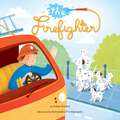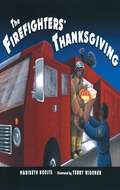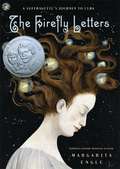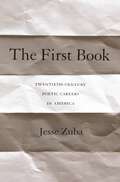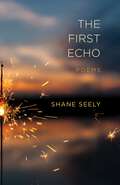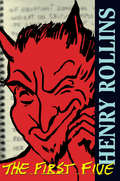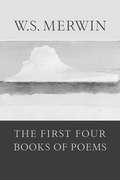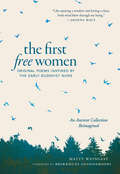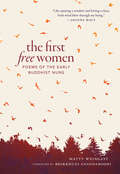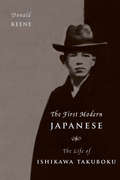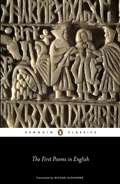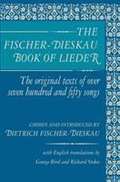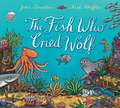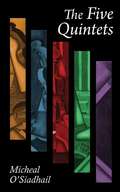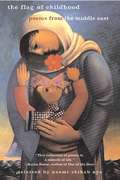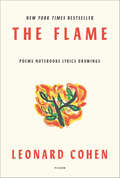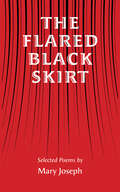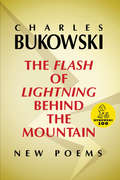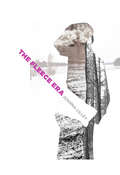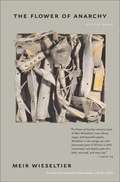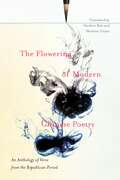- Table View
- List View
The Final Voicemails
by Max Ritvo&“Even present tense has some of the grace of past tense, / what with all the present tense left to go.&” From Max Ritvo—selected and edited by Louise Glück—comes a final collection of poems fully inscribed with the daring of his acrobatic mind and the force of his unrelenting spirit.Diagnosed with terminal cancer at sixteen, Ritvo spent the next decade of his life pursuing poetry with frenetic energy, culminating in the publication of Four Reincarnations. As with his debut, The Final Voicemails brushes up against the pain, fear, and isolation that accompany a long illness, but with all the creative force of an artist in full command of his craft and the teeming affection of a human utterly in love with the world.The representation of the end of life resists simplicity here. It is physical decay, but it is also tedium. It is alchemy, &“the breaking apart, / the replacement of who, when, how, and where, / with what.&” It is an antagonist—and it is a part of the self. Ritvo&’s poems ring with considered reflection about the enduring final question, while suggesting—in their vibrancy and their humor—that death is not merely an end.The Final Voicemails is an ecstatic, hopeful, painful—and completely breathtaking—second collection.
The Fire Horse: Children's Poems by Vladimir Mayakovsky, Osip Mandelstam and Daniil Kharms
by Eugene OstashevskyWhimsical and revolutionary poems and art by some of Russia's foremost avant-garde writers and illustratorsA boy wants a toy horse big enough to ride, but where can his father find it? Not in the stores, which means it’s got to be built from scratch. How? With the help of expert workers, from the carpenter to the painter, working together as one. And now the bold boy is ready to ride off in defense of the future!Two trams, Click and Zam, are cousins. Click goes out for a day on the tracks and before long he’s so tired he doesn’t know where he is or how to get back. All he knows is he’s got to find Zam. Click is looking for Zam and Zam is looking for Click, and though for a while it seems like nobody knows where to find Click, good and faithful Zam is not to be deterred.Peter’s a car, Vasco’s a steamboat, and Mikey’s a plane. They’re all running like mad and going great guns until, whoops, there’s a big old cow, just a plain old cow, standing in the road. What then? The early years of the Soviet Union were a golden age for children’s literature. The Fire Horse brings together three classics from the era in which some of Russia’s most celebrated poets, Vladimir Mayakovsky, Osip Mandelstam, and Daniil Kharms, teamed up with some of its finest artists, Lidia Popova, Boris Ender, and Vladimir Konashevich. Brilliantly translated by the poet Eugene Ostashevsky, this is poetry that is as whimsical and wonderful as it is revolutionary.
The Fire Of Joy: Roughly 80 Poems To Get By Heart And Say Aloud
by Clive JamesClive James read, learned and recited poetry aloud for most of his life. In this book, completed before just before his death, he offers a selection of his favourite poems and a personal commentary on each. In the last months of his life, his vision impaired by surgery and unable to read, Clive James explored the treasure-house of his mind: the poems he knew best, so good that he didn’t just remember them, he found them impossible to forget. The Fire of Joy is the record of this final journey of recollection and celebration. Enthralled by poetry all his life, James knew hundreds of poems by heart. In offering this selection of his favourites, a succession of poems from the sixteenth century to the present, his aim is to inspire you to discover and to learn, and perhaps even to speak poetry aloud. In his highly personal anthology, James offers a commentary on each of the eighty or so poems: sometimes a historical or critical note on the poem or its author, sometimes a technical point about the poem’s construction from someone who was himself a poet, sometimes a personal anecdote about the role the poem played in his own life. Whether you’re familiar with a poem or not ― whether you’re familiar with poetry in general or not ― these chatty, unpretentious, often tender mini-essays convey the joy of James’s enthusiasm and the benefit of his knowledge. His urgent wish was to share with a new generation what he himself had loved. This is a book to be read cover to cover or dipped into: either way it generously opens up a world for our delight.
The Firefighter (Penguin Core Concepts)
by Jenny GoebelBrr-ring! Up pops a fireman at the sound of the fire station alarm, and he rushes with his crew to put out a house fire in a nearby neighborhood. The family is safe, but one of their Dalmatian puppies is missing! It's up to the brave fireman to rescue the pup from the burning house—and in the process, he finds himself a new firehouse friend.The Firefighter covers the concepts of Community Workers & Helpers and Problem Solving.
The Firefighters' Thanksgiving
by Maribeth BoeltsIt's Thanksgiving Day at Station 1 and Lou has planned a fabulous meal. But each time the alarm sounds, the firefighters run to an emergency, leaving half-peeled potatoes and melting ice cream behind. Then, at the biggest fire of the day, Lou gets hurt. Now Thanksgiving dinner doesn't seem as important. Luckily, these firefighters work in a neighborhood where people know the perfect way to share the spirit of the day.
The Firefly Letters: A Suffragette's Journey to Cuba
by Margarita EngleThe freedom to roam is something that women and girls in Cuba do not have. Yet when Fredrika Bremer visits from Sweden in 1851 to learn about the people of this magical island, she is accompanied by Cecilia, a young slave who longs for her lost home in Africa. Soon Elena, the wealthy daughter of the house, sneaks out to join them. As the three women explore the lush countryside, they form a bond that breaks the barriers of language and culture. In this quietly powerful new book, award-winning poet Margarita Engle paints a portrait of early womenâ s rights pioneer Fredrika Bremer and the journey to Cuba that transformed her life.
The First Book: Twentieth-Century Poetic Careers in America
by Jesse Zuba"We have many poets of the First Book," the poet and critic Louis Simpson remarked in 1957, describing a sense that the debut poetry collection not only launched the contemporary poetic career but also had come to define it. Surveying American poetry over the past hundred years, The First Book explores the emergence of the poetic debut as a unique literary production with its own tradition, conventions, and dynamic role in the literary market. Through new readings of poets ranging from Wallace Stevens and Marianne Moore to John Ashbery and Louise Glück, Jesse Zuba illuminates the importance of the first book in twentieth-century American literary culture, which involved complex struggles for legitimacy on the part of poets, critics, and publishers alike. Zuba investigates poets' diverse responses to the question of how to launch a career in an increasingly professionalized literary scene that threatened the authenticity of the poetic calling. He shows how modernist debuts evoke markedly idiosyncratic paths, while postwar first books evoke trajectories that balance professional imperatives with traditional literary ideals. Debut titles ranging from Simpson's The Arrivistes to Ken Chen's Juvenilia stress the strikingly pervasive theme of beginning, accommodating a new demand for career development even as it distances the poets from that demand.Combining literary analysis with cultural history, The First Book will interest scholars and students of twentieth-century literature as well as readers and writers of poetry.
The First Echo: Poems
by Shane SeelyThe First Echo meditates on the comings and goings of midlife—births and deaths, losses and gains, despairs and hopes. In poems that range from rigorous formalism to breathless free verse, Shane Seely reaches for instruction, understanding, and comfort. He finds solace in works of art—including paintings, literature, and film—as well as in nature, human relationships, and memory. He suggests that, like the bat or the whale, we humans understand ourselves through echo, through the sounds we send out and the sounds that come back. That returning voice, like our own and yet not quite ours, reminds us that to be alone is to be with a self that is at once strange and familiar. Evocative and engaging, The First Echo offers poems on memory, illness, and grief—reflecting on the sadness and knowledge attached to each.
The First Five
by Henry RollinsThe first five books by Henry Rollins combined in one volume. Includes High Adventure in the Great Outdoors, Bang!, Art to Choke Hearts, Pissing In The Gene Pool and One From None.
The First Four Books of Poems
by W. S. MerwinHalf Roundel I make no prayer For the spoilt season, The weed of Eden. I make no prayer. Save us the green In the weed of time. Now is November; In night uneasy Nothing I say. I make no prayer. Save us from the water That washes us away. What do I ponder? All smiled disguise, Lights in cold places, I make no prayer. Save us from air That wears us loosely. The leaf of summer To cold has come In little time. I make no prayer. From earth deliver And the dark therein. Now is no whisper Through all the living. I speak to nothing. I make no prayer. Save us from fire Consuming up and down. Evening with Lee Shore and Cliffs Sea-shimmer, faint haze, and far out a bird Dipping for flies or fish.
The First Free Women: Original Poems Inspired by the Early Buddhist Nuns
by Matty WeingastAn Ancient Collection ReimaginedComposed around the Buddha&’s lifetime, the original Therigatha (&“Verses of the Elder Nuns&”) contains the poems of the first Buddhist women: princesses and courtesans, tired wives of arranged marriages and the desperately in love, those born into limitless wealth and those born with nothing at all. The authors of the Therigatha were women from every kind of background, but they all shared a deep-seated desire for awakening and liberation. In The First Free Women, Matty Weingast has reimagined this ancient collection and created an original work that takes his experience of the essence of each poem and brings forth in his own words the struggles and doubts, as well as the strength, perseverance, and profound compassion, embodied by these courageous women.
The First Free Women: Poems of the Early Buddhist nuns
by Matty WeingastA radical and vivid rendering of poetry from the first Buddhist nuns that brings a new immediacy to their voices.The Therigatha ("Verses of the Elder Nuns") is the oldest collection of known writings from Buddhist women and one of the earliest collections of women's literature in India. Composed during the life of the Buddha, the collection contains verses by early Buddhist nuns detailing everything from their disenchantment with their prescribed roles in society to their struggles on the path to enlightenment to their spiritual realizations. Among the nuns, a range of voices are represented, including former wives, women who lost children, women who gave up their wealth, and a former prostitute. In The First Free Women, Matty Weingast revives this ancient collection with a contemporary and radical adaptation. In this poetic re-envisioning that remains true to the original essence of each poem, he infuses each verse with vivid language that is not found in other translations. Simple yet profound, the nuance of language highlights the beauty in each poem and resonates with modern readers exploring the struggles, grief, failures, doubts, and ultimately, moments of profound insight of each woman. Weingast breathes fresh life into this ancient collection of poetry, offering readers a rare glimpse of Buddhism through the spiritual literature and poetry of the first female disciples of the Buddha.
The First Modern Japanese: The Life of Ishikawa Takuboku (Asia Perspectives: History, Society, and Culture)
by Donald KeeneMany books in Japanese have been devoted to the poet and critic Ishikawa Takuboku (1886–1912). Although he died at the age of twenty-six and wrote many of his best-known poems in the space of a few years, his name is familiar to every literate Japanese. Takuboku's early death added to the sad romance of the unhappy poet, but there has been no satisfactory biography of his life or career, even in Japanese, and only a small part of his writings have been translated. His mature poetry was based on the work of no predecessor, and he left no disciples. Takuboku stands unique.Takuboku's most popular poems, especially those with a humorous overlay, are often read and memorized, but his diaries and letters, though less familiar, contain rich and vivid glimpses of the poet's thoughts and experiences. They reflect the outlook of an unconstrained man who at times behaved in a startling or even shocking manner. Despite his misdemeanors, Takuboku is regarded as a national poet, all but a saint to his admirers, especially in the regions of Japan where he lived. His refusal to conform to the Japan of the time drove him in striking directions and ranked him as the first poet of the new Japan.
The First Poems in English
by Michael AlexanderThis selection of the earliest poems in English comprises works from an age in which verse was not written down, but recited aloud and remembered. Heroic poems celebrate courage, loyalty and strength, in excerpts from Beowulf and in The Battle of Brunanburgh, depicting King Athelstan’s defeat of his northern enemies in 937 AD, while The Wanderer and The Seafarer reflect on exile, loss and destiny. The Gnomic Verses are proverbs on the natural order of life, and the Exeter Riddles are witty linguistic puzzles. Love elegies include emotional speeches from an abandoned wife and separated lovers, and devotional poems include a vision of Christ’s cross in The Dream of the Rood, and Caedmon’s Hymn, perhaps the oldest poem in English, speaking in praise of God.
The Fischer-dieskau Book of Lieder: The original text of over seven hundred and fifty songs
by Dietrich Fischer-DieskauThis book presents German original texts with English translations in line-by-line format of over 750 German Lieder, including texts for Beethoven's An die ferne Geliebte and Six Gellert Lieder; Brahms's Die schöne Magelone, Four Serious Songs and Gypsy Songs; Paul Hindemith's Life of Mary; Mahler's Song of the Earth, Kindertotenlieder and Song of a Wayfarer; Schubert's Die schöne Müllerin, Die Winterreise and Schwanengesang; Schumann's Dichterliebe, Liederkreis collections and Frauenliebe und -leben; Richard Strauss's Four Last Songs; Hugo Wolf's Italian and Spanish songbooks; Boris Blacher's 3 Psalms in Martin Luther's German; Richard Wagner's Five Poems for a Woman's Voice; Schönberg's Fifteen Poems from "The Book of the Hanging Gardens"; Alban Berg's Seven Early Lieder; Peter Cornelius's Trauer und Trost and Weihnachtslieder. Added to these song collections are nearly 500 texts for individual songs set by Beethoven, Brahms, Mozart, Schubert, Schumann, Richard Strauss, Zemlinsky and others. Fischer-Dieskau introduces the collection with an essay and individual song texts are in alphabetical order. The Index of titles and first lines at the back of the book serves as the table of contents. DAISY markup makes perusing this book easy and electronic searching makes it an excellent companion for anyone who has recordings of these songs or who would like to sing them. Dieskau does not include the text for Wagner's Wesendonck Lieder.
The Fish Who Cried Wolf
by Julia DonaldsonTiddler is the smallest fish in the ocean, but he tells the TALLEST tales: "Sorry I'm late, Miss. I set off really early But on my way to school I was captured by a squid. I wriggled and I struggled till a turtle came and rescued me." "Oh no he didn't." "Oh yes he did." But then one day on the way to school, Tiddler gets caught in a fisherman's net. How can the little fish with the big mouth talk his way out of this one?
The Five Quintets
by Micheal O'SiadhailThe Five Quintets is both poetry and cultural history. It offers a sustained reflection on modernity--people and movements--in poetic meter. Just as Dante, in his Divine Comedy, summed up the Middle Ages on the cusp of modernity, The Five Quintets takes stock of a late modern world on the cusp of the first-ever global century. <p><p> Celebrated Irish poet Micheal O'Siadhail structures his Quintets to echo the Comedy. Where Dante had a tripartite structure ( Inferno, Purgatorio, and Paradiso), O'Siadhail has a five-part structure, with each quintet devoted to a discipline--the arts; economics; politics; science; and philosophy and theology. Each quintet is also marked by a different form: sonnets interspersed by haikus ("saikus"), iambic pentameter, terza rima, and two other invented forms. <p> The Five Quintets captivates even as it instructs, exploring the ever-changing flow of ideas and the individuals whose contributions elicited change and reflected their times. The artists, economists, politicians, scientists, and philosophers O'Siadhail features lived complex lives, often full of contradictions. Others, though deeply rooted in their context, transcended their time and place and pointed beyond themselves--even to us and to a time after modernity's reign. <p> The ancient Horace commended literature that delivered "profit with delight." In The Five Quintets, Micheal O'Siadhail has done just that: he delights us in the present with his artistry, even as he reveals hidden treasures of our past and compels us toward the future.
The Flag of Childhood
by Naomi Shihab NyeIn this stirring anthology of sixty poems from the Middle East, honored anthologist Naomi Shihab Nye welcomes us to this lush, vivid world and beckons us to explore. Eloquent pieces from Palestine, Israel, Egypt, Iraq, and elsewhere open windows into the hearts and souls of people we usually meet only on the nightly news. What we see when we look through these windows is the love of family, friends, and for the Earth, the daily occurrences of life that touch us forever, the longing for a sense of place. What we learn is that beneath the veil of stereotypes, our human connections are stronger than our cultural differences.
The Flame: Poems, Notebooks, Lyrics, Drawings
by Leonard CohenA Stirring Mosaic of Leonard Cohen: Poet, Lyricist and ArtistDive into The Flame, a profound exploration of the celebrated poet and musician, Leonard Cohen. This final work, hailed as a top read by Vogue, TIME, and The Washington Post, offers a rich blend of his life's work, sure to ignite the imagination of Cohen's enduring fans and newcomers alike.With his works spanning generations and continents, Cohen is a remarkable figure who continues to captivate audiences—his ground trodden upon by “very, very few” (Bono).The Flame provides a deeply personal view of Cohen, weaving a vivid tapestry of poems, diary excerpts, lyrics, and intimate hand-drawn self-portraits. This trailblazing collection presents a multi-faceted view of a life lived passionately.“This volume contains my father’s final efforts as a poet,” writes Cohen’s son, Adam Cohen, in his foreword. “It was what he was staying alive to do, his sole breathing purpose at the end.”Whether you’re a lyricist, musician, or a Cohen devotee, The Flame is a glowing tribute to Leonard Cohen that’s sure to inspire and captivate.
The Flared Black Skirt: Selected Poems
by Mary JosephIn this insightful and thought-provoking selection of poems, the reader is taken on a journey through life and death, love and heartbreak, joy and hardship: in other words, human existence in its myriad aspects. Written in deceptively simple language and often in the form of homilies and riddles, these poems cast the familiar in an unfamiliar light. Skilfully employing repeating patterns, personification and metaphor, the author offers a compelling reflection on who we are and how we navigate the world around us.
The Flash of Lightning Behind the Mountain: New Poems
by Charles BukowskiThe second of five new books of unpublished poems from the late, great, Charles Bukowski, America's most imitated and influential poet -- 143 never-before-seen works of gritty, amusing, and inspiring verse.
The Fleece Era
by Joanna LilleyThe Fleece Era is Yukon-based, UK-born Joanna Lilley's first book of poems: a wry and eloquent testament to the intricacies of our various relationships. From the shattered pieces of our environmental puzzles to the labyrinth of family dynamics, Lilley makes these dilemmas come alive. Chillingly sparse, attractively odd and refreshingly frank, The Fleece Era embraces the complexities of human life with an unsettling mix of the sardonic and the compassionate.
The Flower of Anarchy: Selected Poems
by Meir Wieseltier Shirley KaufmanA collection of poems by acclaimed Israeli poet Meir Wieseltier, translated by Shirley Kaufman.
The Flowering of Modern Chinese Poetry: An Anthology of Verse from the Republican Period
by Herbert Batt Sheldon ZitnerThe May Fourth Movement launched an era of turmoil and transformation in China, as Western ideas and Western-style education encroached on the Confucian traditions that lay at the foundation of Chinese society. The reverberations for Chinese culture and literature were profound. The Republican period (1919-1949) witnessed an outpouring of poetry in a form and style new to China, written in the common people’s language baihua ("plain speech").The New Poetry broke with the centuries-old tradition of classical poetry and its intricate forms. The Flowering of Modern Chinese Poetry presents English translations of over 250 poems by fifty poets, including a rich selection of poetry by women writers. The anthology provides a nuanced picture of the astonishingly rapid development of vernacular verse in China from its emergence during the May Fourth Movement, through the years of the Japanese invasion, to the Communist victory in the Civil War in 1949. Michel Hockx introduces the historical and literary contexts of the various schools of vernacular poetry that developed throughout the period: characterized as those of the pioneers, formalists, symbolists, "soldiers and peasants" poets, and Shanghai Poets of the late 1940s. Each selection of verse begins with a biographical sketch of the author’s life and literary career, including their roles in the Civil War and the resistance to the Japanese occupation. Introducing English readers to master poets who are virtually unknown to Western audiences, this anthology presents a collection of verse written in an age of struggle that attests to the courage, sensitivity, and imagination of the Chinese people. The rise of China’s modern poetry reflects the rise of modern China.
The Flowering of Modern Chinese Poetry: An Anthology of Verse from the Republican Period
by Herbert Batt Sheldon ZitnerA collection of early twentieth-century vernacular poetry that foreshadows the emergence of the modern Chinese nation.
